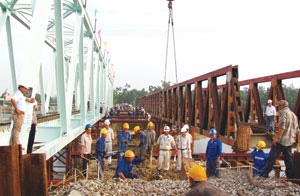Japanese ODA putting railway bridge reinforcement on track
 According to Japan International Cooperation Agency (JICA) in Vietnam, an agreement on Vietnam’s borrowing of 13.79 billion yen ($147 million) in official development assistance (ODA) from Japan will be inked on March 22 between JICA and Vietnam’s Ministry of Finance.
According to Japan International Cooperation Agency (JICA) in Vietnam, an agreement on Vietnam’s borrowing of 13.79 billion yen ($147 million) in official development assistance (ODA) from Japan will be inked on March 22 between JICA and Vietnam’s Ministry of Finance.
The sum, which will be added by the Vietnamese government’s VND1 trillion ($48 million) as a contribution, will be used for a nine-package project to upgrade 44 railway bridges located from northern Ninh Binh province to Ho Chi Minh City. At present, 10 out of these bridges have been upgraded, 18 are being upgraded currently and work bids are being sought for the other 16.
For example, bridges that have deteriorated with age which are located over at 230-km stretch kilometres from the south to central Danang city have been replaced with new steel bridges including foundation structures. A package to upgrade the bridges of Thap Cham and Song Quao in southern central Ninh Thuan province and four bridges of Song Lon, Song Nho, Song Luy and Muong Man in southern central Binh Thuan province will be put out to tender on March 18, 2013.
“All the tender process will be open and transparent to construction firms,” said Suzuki Taketomo, project manager of Hanoi-Ho Chi Minh City Railway Line Bridges Safety Improvement Project Construction Package No2.
“Under our plan, this project will be wholly completed in 2016,” said Nguyen Van Anh, deputy chief of Project Implementation Department No.1 under the state-owned Vietnam Railway Corporation’s Railway Projects Management Unit.
“This project will help reduce the trains’ running hours from the existing 27 hours to 24 hours. It will also help the trains transport passengers and goods in a safer manner and ensure railway safety,” Taketomo said.
The project has been implemented by Japanese construction firms including Tekken, Manuberi, Yokogawa, Mitsui Ship Building, Rinkai and Taisei, and Vietnamese construction firms like CIENCO1 and Thang Long.
The new ODA loan will be the third one of the type between Vietnam and Japan, with the first one worth 8.222 billion yen ($87.87 million) signed in 2004 and the second one worth 11.737 billion ($125.43 million) clinched in 2005. These sums were also used for upgrading 19 weak railway bridges, helping to reduce the train’s running hour from 36 hours in 1994 to 29 hours in 2007.
Nguyen Dinh Thao, senior programme officer from Japan International Cooperation Agency, said all the bridges that had and would be upgraded were installed with Japan’s environmental friendly technology including stainless steel. Japanese know-how, he said, was also used in the construction management of steel girders, direct fastening track, long rails and cast-in-place piling.
“Moreover, though the Japanese government is now depreciating the yen to spur its economic development, the value of the ODA loan will not be affected as the value of the yen has been fixed at time of making design of this project,” Thao said.
What the stars mean:
★ Poor ★ ★ Promising ★★★ Good ★★★★ Very good ★★★★★ Exceptional
Related Contents
Latest News
More News
- Hermes joins Long Thanh cargo terminal development (February 04, 2026 | 15:59)
- SCG enhances production and distribution in Vietnam (February 04, 2026 | 08:00)
- UNIVACCO strengthens Asia expansion with Vietnam facility (February 03, 2026 | 08:00)
- Cai Mep Ha Port project wins approval with $1.95bn investment (February 02, 2026 | 16:17)
- Repositioning Vietnam in Asia’s manufacturing race (February 02, 2026 | 16:00)
- Manufacturing growth remains solid in early 2026 (February 02, 2026 | 15:28)
- Navigating venture capital trends across the continent (February 02, 2026 | 14:00)
- Motivations to achieve high growth (February 02, 2026 | 11:00)
- Capacity and regulations among British areas of expertise in IFCs (February 02, 2026 | 09:09)
- Transition underway in German investment across Vietnam (February 02, 2026 | 08:00)

 Tag:
Tag:




















 Mobile Version
Mobile Version